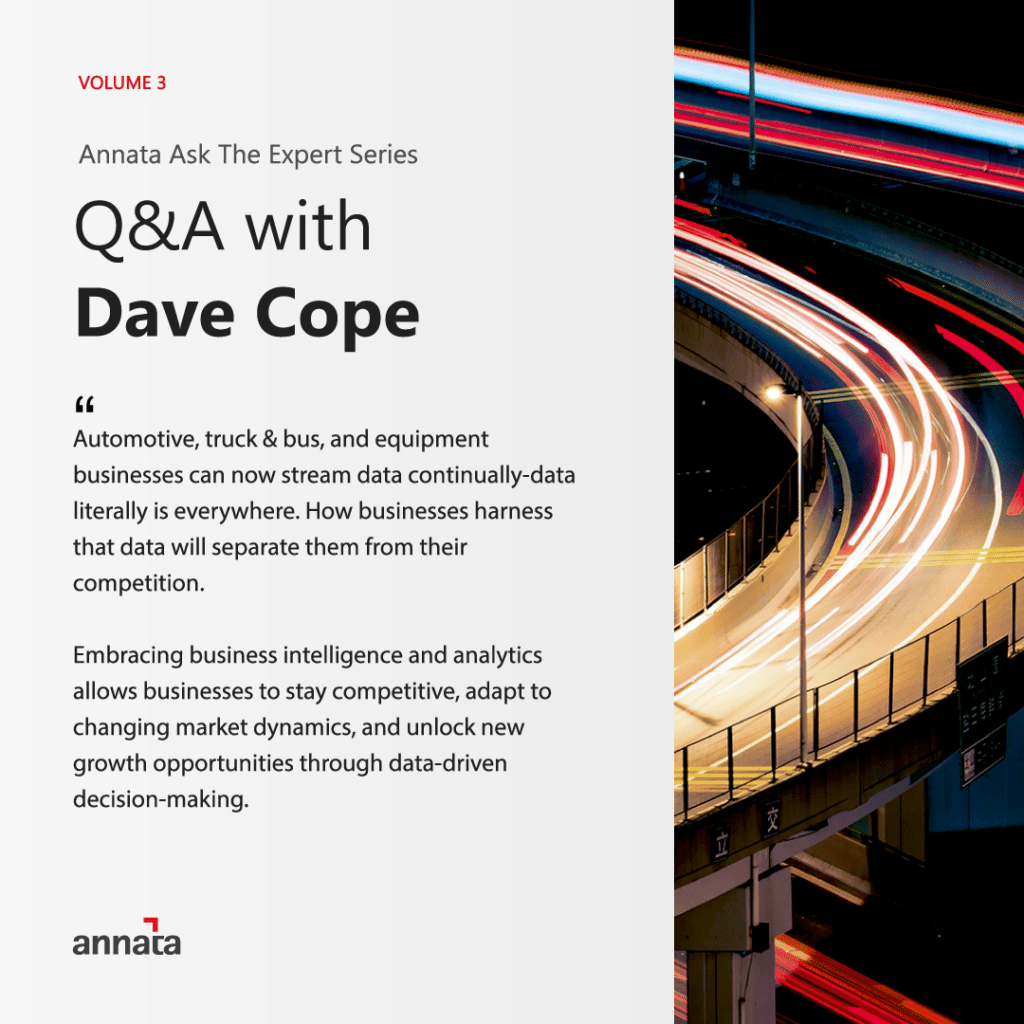In the ever-evolving landscape of the automotive and equipment industries, data-driven decision-making has emerged as a critical driver of success. As businesses continue to navigate complex challenges and embrace digital transformation, the power of business intelligence (BI) and analytics becomes increasingly apparent. To shed light on the significance of BI in the automotive and equipment sector, we had the honor of sitting down with Dave Cope, Head of Global Black Belts at Annata.
As the leader of Global Black Belts—a team renowned for their expertise in process optimization, data analysis, and business strategy—Cope brings a unique perspective on the growing role of BI in driving innovation, efficiency, and sustainable growth.
In this exclusive interview, we delve into Dave Cope’s insights and observations regarding the impact of business intelligence on automotive and equipment companies. We explore the strategies, challenges, and opportunities that lie ahead for the industry, and uncover the key to unlocking the full potential of BI in the pursuit of excellence.
1. Tell us a bit about your professional journey.
I joined Annata in Spring 2018 having worked as a Business Analyst within the UK Construction Sector for the previous 10 years. My time in the construction industry taught me many things, not least that my passion for analytics isn’t always shared. When the opportunity arose to join a company that would allow me to work with the latest technology and explore the art of the possible, I jumped at the chance.
Since arriving I have been fortunate to see my role evolve from that of a BI Developer to being able to embrace the entirety of the Microsoft Power Platform and Microsoft Dynamics 365 stack daily. Working closely with my colleagues and with Microsoft has given me the ability to challenge myself continually which is something that drives me forward.
More recently I have assumed the role of Head of Global Black Belts meaning I get the chance to work with a wider network of people across Annata, our customers, partners, and Microsoft.
2. How do you think business intelligence and analytics are transforming the automotive and equipment industries?

3. Do you think analytics has been gaining momentum in these two industries in recent years? Why do you think this is happening now?
Absolutely! Analytics has been gaining significant momentum in the automotive and equipment industries in recent years. There are a few key factors contributing to this. Firstly, advancements in technology have made it easier and more cost-effective to collect, store, and process large volumes of data.
The advent of Internet of Things (IoT) devices, connected vehicles, and smart equipment has exponentially increased the amount of data available for analysis. This data explosion has created a tremendous opportunity for businesses to leverage analytics to gain valuable insights and drive innovation.
4. Predictive analytics is developing into a powerful tool for generating an enormous boost in forecasting efficiency as well as operations and performance. How will this benefit automotive and equipment businesses?
It is one thing knowing what has happened, but it is something else entirely being able to predict what will happen next. Moving from reactive to predictive analytics offers automotive and equipment businesses several significant benefits. By leveraging predictive analytics, businesses can achieve operational excellence, make data-driven decisions, and gain a competitive edge in their market.
5. How will analytics shape the future of the automotive and equipment industries?
Analytics is going to have a huge impact on the future of the automotive and equipment industries. As these industries get more connected and data-driven, analytics will be a game-changer, unlocking new opportunities and driving innovation. Businesses, as well as devices themselves, will be able to make real-time decisions, adapting to different situations and making smart choices based on analytics.
Analytics is also going to transform the customer experience. With IoT and connected devices, automotive and equipment businesses will be able to gather ever more data on how their products are used, maintained, and serviced. By efficiently harnessing this data via the Annata solution stack, A365.
A365 delivers a comprehensive and future-proof solution that empowers our customers with the latest tools and functionalities, ensuring your business remains equipped with state-of-the-art capabilities. This enables companies to personalize their offerings, give targeted recommendations, and deliver best-in-class customer service.
6. There have been a lot of advancements within the analytics sphere. What are some future trends we can anticipate for analytics within the next 3-5 years?
In the era of AI, it will be easier than ever to find insights into data. Asking natural language questions about your data will become commonplace. This will enable non-technical users to access data in real-time and get the results they need in the blink of an eye. Those results will be curated into apps and reports on the fly giving users the ability to slice and dice millions (even billions) of rows of data as easily as slicing through butter.
The future of analytics will revolve around automation, advanced AI techniques, real-time capabilities, and integration with other emerging technologies. These trends will further empower businesses in the automotive and equipment industries to make data-driven decisions, gain valuable insights, and stay ahead of the competition.
7. What are some challenges automotive and equipment businesses today face with analytics?
Traditionally the integration of data from disparate sources can be complex and time-consuming. Additionally, ensuring data quality and accuracy is crucial for reliable analytics, requiring businesses to establish robust data governance practices.
Businesses will need to invest in training their workforce with experts to build a capable analytics team. Additionally, staying up to date with rapidly evolving analytics technologies and techniques is essential.
Modern analytics require robust and scalable infrastructure to store, process, and analyze large volumes of data. Building and maintaining such infrastructure has previously been costly and resource intensive. Cloud computing and scalable analytics platforms, utilizing Microsoft Azure and Microsoft Fabric, can help overcome these challenges by providing flexible and cost-effective solutions.
Organizations must also carefully plan and design their infrastructure to support growing analytics needs.
Adopting analytics often requires a shift in mindset and culture within a business, where data-driven decision-making becomes the norm. Resistance to change, lack of buy-in from stakeholders, and organizational silos can impede the successful adoption of analytics. Businesses should foster a culture that embraces analytics as a strategic asset.
8. How can businesses capture and utilize their data more efficiently and effectively?


9. How is Annata supporting automotive and equipment businesses in their pursuit of harnessing data?
Annata is at the forefront of empowering automotive and equipment businesses in harnessing the power of data. Through our product, A365, we offer comprehensive capabilities that cover finance, operations, and the full Customer Engagement (CE) stack of Microsoft Dynamics 365.
A365 provides a unified platform that integrates with various data sources, allowing businesses to capture and consolidate data from different systems and processes. This ensures a single source of truth and enables organizations to gain a holistic view of their operations.
By partnering with Annata and leveraging our robust solutions, automotive and equipment businesses can effectively harness data, unlock valuable insights, and achieve operational excellence in a data-driven world.
As we strive to work on the bleeding edge of what is possible, Annata has helped customers around the world harness their data more successfully. From our out-of-the-box data models and reports that ship with A365 Finance & Operations to working on the latest capabilities provided across Azure, and now Fabric, we are continually shortening time to insight for our customers.
By providing a modern approach to analytical solutions we have helped drive the adoption of analytics into businesses that previously had little to no experience in this area. From enabling citizen developers to work on certified datasets and create reports for their teams to putting key KPIs and metrics into the hands of the CxO we can provide powerful insights right in line where users benefit most.
This means A365 users can continue to use the modern workplace in the way are used to and get the data they need when and how they want it, whether this be embedded in A365, or on their mobile device.
10. How does analytics drive sustainability initiatives for the automotive and equipment business?
Analytics can play a crucial role in driving sustainability initiatives for the automotive and equipment business by providing valuable insights and facilitating data-driven decision-making.
For example, analytics can help identify energy inefficiencies within manufacturing processes and operations. By analyzing energy consumption patterns and identifying areas of improvement, businesses can optimize energy usage, reduce waste, and minimize their carbon footprint.
Predictive analytics within maintenance practices can help reduce equipment failures and optimize maintenance schedules. By analyzing sensor data, historical maintenance records, businesses can detect potential failures before they occur, reducing downtime, optimizing maintenance activities, and minimizing the need for emergency repairs or replacements.
Also, by analyzing customer data, businesses can gain insights into consumer behavior, demand patterns, and market trends, allowing them to design and market sustainable products that meet customer expectations.
11. In your opinion, what are some ways businesses can use data to prepare for a digital future?
Harnessing data to understand customer needs and preferences is crucial for staying competitive in a digital world. By analyzing customer data businesses can identify preferences, behavior patterns, and emerging trends. This insight enables them to personalize their products and services, tailor marketing strategies, and enhance the customer experience.
Similarly, businesses should leverage data for predictive analytics and forecasting. By analyzing historical data and market trends, businesses can make accurate predictions regarding future demand and market conditions to enable proactive planning,
Analyzing operational data can help businesses identify bottlenecks, inefficiencies, and areas for improvement. This includes streamlining processes and supply chain operations as well as automating manual tasks.
Businesses can also harness data to drive innovation and develop new business models. Data-driven innovation allows businesses to stay ahead of the curve, adapt to changing market dynamics, and create new revenue streams.
12. Is there anything else you would like to add?
The integration of BI and analytics into the automotive and equipment industries is revolutionizing the way these businesses operate. The ability to capture, analyze, and utilize data offers tremendous opportunities for improving efficiency, making data-driven decisions, and driving innovation.
With the increasing availability of data from various sources and advancements in analytics technologies, businesses can gain valuable insights to optimize their operations, enhance customer experiences, and embrace sustainability.
As Annata continues to grow, our dedication to helping businesses harness data will undoubtedly help to drive innovation, optimize operations, and fuel success in the ever-evolving automotive and equipment industries.
Being part of this journey within these industries, and with Annata, presents a unique opportunity to shape the digital future, contribute to sustainable practices, and be at the forefront of the exciting transformation happening in this space.
For further information on how A365 supports automotive and equipment businesses in their business intelligence and analytics needs, visit Annata Analytics.












